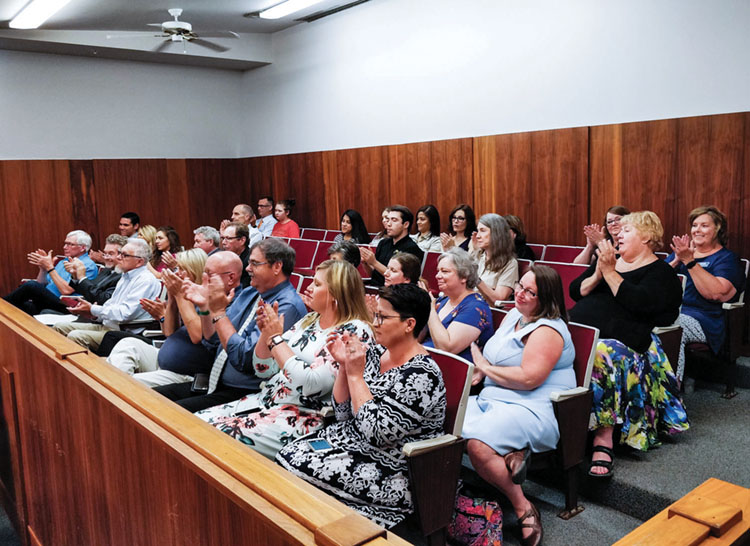
Photo by Aprile Rickert/The News and Tribune (Jeffersonville, Ind.)
By Haley Loquercio | Intern, Office of Communication, Education, and Outreach
Throughout the past year, Indiana courts have worked to help combat the significant rise in opioid overdose deaths. This spring, the Substance Abuse and Mental Health Services Administration (SAMHSA), Center for Substance Abuse Treatment announced the recipients for its 2018 Family Treatment Drug Courts Grant. Clark and Marion counties were each thrilled to be recipients of a $2 million grant. These Indiana counties were two of only thirteen counties nationwide to receive this award.
Both Clark and Marion counties’ family treatment drug courts provide substance abuse treatment, rehabilitation, education, and other resources to help parents who have struggled with drug or alcohol abuse become reunited with their children. The purpose of each $2 million grant is to “expand or enhance substance use disorder treatment services in existing family treatment drug courts” over the course of five years.
Clark County
Clark County’s Family Treatment Drug Court began in June 2006 and is led by the Honorable Vicki Carmichael, Judge, Clark Superior Court #4. Bridge to Success, the reunification treatment program began in 2011, currently helps about 25 families per year. This number will expand with the new grant. During the five-year grant period, Clark County will be able to assist over 175 families.
Chief Justice Loretta Rush attended the June 8 community event announcing the receipt of the grant in Jeffersonville. She congratulated Clark County and said, “Judge Carmichael’s work with the Family Treatment Drug Court is a model for how courts can help combat the drug crisis.”
Judge Carmichael recognized the importance of helping families struggling with addiction and stated, “This is one way we can help break the cycle of addiction and broken families, and the grant means we can do it at little or no cost to taxpayers.”
Iris Rubadue, Probation Officer and Project Manager of Clark County’s SAMHSA grant, added: “Since Family Treatment Drug Court is offered at no charge to its participants, it can prove to be pretty costly especially when there are over 25 people enrolled and participating. Once we learned that we were awarded the grant, it was a huge weight lifted off of our shoulders knowing that we will have the financial ability to implement these program(s).”

Marion County
Marion County’s Drug Treatment Court was created in 1998. Their Family Recovery Court (MCFRC) Program, which began in 2010, is a partnership between Marion County’s substance use disorder treatment providers and juvenile court, led by Magistrate Diana Burleson. Family Recovery Court clients volunteer that Magistrate Burleson is a huge reason why they continue to come back to court each week.
The goal of the MCFRC Program is to help families with a Child in Need of Services (CHINS) case address substance abuse and mental health to prepare the parents to be reunited with their children.
During their five-year grant period, along with expanding the number of families who can enroll in the program, MCFRC will focus on increasing funding for residential treatment options and create a father-specific addition to the program, which has served mostly mothers in the past.
Magistrate Burleson, who is looking forward to the increased number of families the MCFRC will be able to serve, said: “So many of our success stories have expressed gratitude for this program, and we want to continue improving our services so we can help even more Marion County families heal.”
Lara Schilling, the Family Court Coordinator and Project Director for the Marion County SAMHSA Grant, stressed that creating a safe, effective place for families to go through treatment takes the work of many.
“Our program is huge on partnerships and team collaboration. Our case specialist, Lizzy McGrevy, also plays a huge role in our program – she’s been with the program since 2012 and is really passionate about community engagement.”
Working for the Future
Schilling (Marion) noted that while there is still stigma surrounding addiction, “We have copious evidence that it is a medical condition that affects the brain. This disease should be treated like any other serious medical disorder, and many individuals struggling with addiction benefit from the more intensive treatment, case management, support and accountability offered by drug courts.”
The work to combat the opioid epidemic is extremely important because it helps saves lives in the present and the future. And, as Iris Rubadue (Clark) observed, “It is beneficial for future generations because in their parents’ sobriety comes stability, love, support, and most importantly, positive role models for children.”